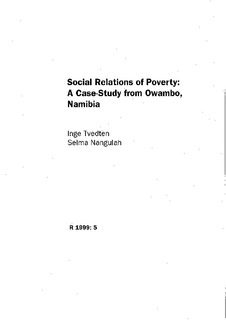Social Relations of Poverty: A Case-Study from Owambo, Namibia
Research report
Permanent lenke
http://hdl.handle.net/11250/2435834Utgivelsesdato
1999Metadata
Vis full innførselSamlinger
- Bora-import [434]
Sammendrag
Evidence from a number of quantitative studies on poverty in Namibia suggests that poverty is widespread, albeit unevenly distributed. The relatively high GDP per capita conceals wide income differentials by geographical location, occupation, age and gender. This study addresses urban poverty and the importance of social relations and networks ('social capita!') in the coping strategies of the poor - a phenomenon which has received little attention in poverty research. On the basis of case studies of four shantytowns in Oshakati and two rural villages with extensive links to urban areas, it is argued that the poorest sections of the urban shantytowns are systematically marginalised and excluded from political, economic and social processes. Horizontal transfers and social capital play a role in spreading risk and reducing vulnerability - though more so for the somewhat better off than for the poorest in a setting where social relations increasingly have to be filled with material content to be sustainable. People apparently trapped in poverty and vulnerability are those for whom the shantytown encapsulates their universe both in socio-economic and cultural terms. While interventions with a view to developing social capital in the form of networks, associations, etc. are helpful, any serious attempt to reduce urban poverty in Namibia requires vertical transfers through an active public policy commitment by the government.
The study has been conducted under the Agreement of Cooperation between the Social Sciences Division of theUniversity of Namibia (SSD/UNAM), the Namibia EconomicPolicy Research Unit (NEPRU) and the Chr. MichelsenInstitute.Inge Tvedten, Chr. Michelsen Institute, Bergen, NorwaySelma Nangulah, Social Sciences Division, University ofNamibia
Utgiver
Chr. Michelsen InstituteSerie
Research reportR 1999: 5
